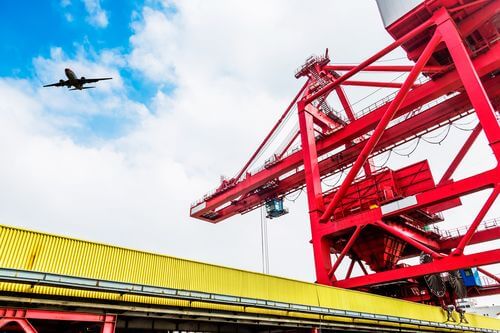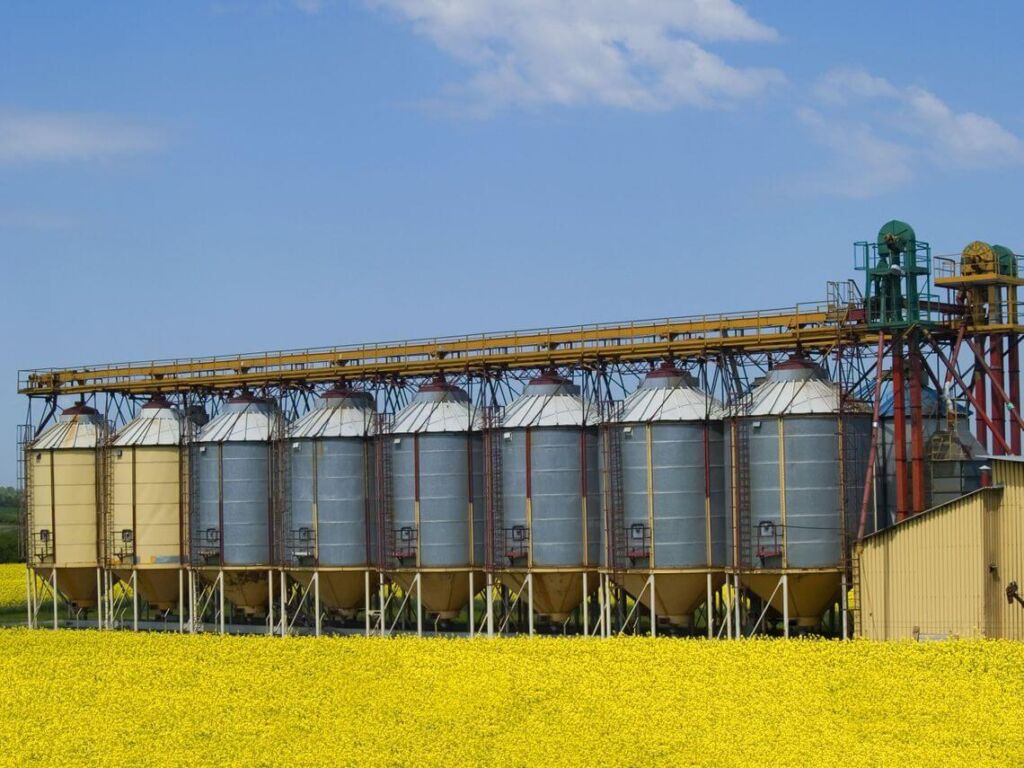The complete guide to crane scales
Crane scales are a type of hanging scale used in a wide range of commercial and industrial operations. Here’s everything you need to know about them, including common applications, purchasing advice and safety considerations.
What’s a crane scale? Crane scales, and hanging scales in general perform two important functions: they provide a measurement of an item’s weight and they ensure operators don’t overload cranes or hoists. Overloading presents a safety hazard as well as considerable losses due to broken equipment and machinery. They’re ideal for measuring bulky, oversized loads that can’t be easily weighed using platform scales. They’re typically used for things like weighing freight before it’s transported on planes, trains and ships and determining whether a load is too heavy to be lifted by a crane or other piece of equipment. Crane scales are attached to the crane or hoist’s hook. The digital readout indicates the weight of the load as well as the amount of force being placed on the crane, allowing you to determine whether the crane can transport it. Crane scales vary widely in price, depending on features and capacity. Key features Crane scales range from high-capacity steel units designed for heavy-duty use to precise and lightweight aluminum small-capacity units. Modern crane scales are built to be used in dynamic work environments, meaning they’re not influenced by swaying and they have built-in stability adjustment capabilities to accommodate a range of environmental conditions. Properly calibrated, crane scales offer an efficient and flexible way to weigh materials, as most of them allow operators to switch between different measurement units. In addition, they’re accurate within 0.1 to 0.2 per cent, even when weighing the heaviest of objects. Finally, their large LED screen allows operators to read results from several feet away, even in low visibility conditions. Why you may need crane scales Crane scales have many advantages over traditional weighing solutions. Here are some reasons you might want to consider purchasing one.
-
You need to save floor space. Space is usually at a premium and your facilities may not be able to accommodate a weighing area or floor scale. A crane scale can be taken to the item you need to weigh, meaning you don’t need to sacrifice precious space.
-
You need to weigh awkwardly shaped items. Some items are unwieldy and awkward to balance. A crane system will allow you to weigh these items precisely and accurately.
-
You need accurate measurements. If you’re loading a freighter, manufacturing an aircraft tire or using your scale to portion out goods sold by weight, then precision and accuracy are crucial. Some models can withstand industrial use while providing measurements that are accurate within 0.1 per cent with a capacity of up to 200,000 kilograms (about 220 U.S. tons).
-
You want to streamline operations. Eliminating the need to move items to a specific weigh station means more hours of labour going toward increasing productivity. Cutting down on forklift traffic will allow you to keep your team focused on bringing in and processing customer orders.
-
You want a safer workspace. With crane scales, you don’t need to transport goods to a weighing area with forklifts. A decrease in forklift traffic means fewer opportunities for accidents, injuries and losses. Your operations will be safer and more efficient.
8 things to consider before buying a crane scale The advantages of crane scales are fairly clear. However, here are eight key things to consider when deciding which one you should purchase.
-
The average load weight. Perhaps the most important factor to consider when choosing a crane scale is the average weight of the load you’ll be weighing. Some scales can handle loads that that weigh upwards of 100,000 kilograms while others are designed to give very precise measurements for small loads of 10 to 50 kilograms. Keep in mind that the expected maximum weight shouldn’t exceed two-thirds of the maximum permissible rated load of the scale. Otherwise, you’re putting the equipment and everyone nearby in danger.
-
Industry and applications. Make sure the model you purchase matches your specifications and application needs. You’ll need a much more durable and heavy-duty hanging scale for lifting large loads on a construction site or shipping dock than for weighing smaller loads in a store or stockroom. You should also consider whether you’ll need to be able to attach the scale to other equipment, read the display screen from far away or operate the scale remotely.
-
Manufacturing compliance. Make sure the company you’re buying from manufactures and calibrates in accordance with local regulations, especially those related to measurement values, units, accuracy and safety.
-
Ease of use. You want crane scales that are easy to use and read. Hard-to-use models could cancel out the efficiency gains of using crane scales in addition to introducing a higher risk of error and accidents.
-
Precision and accuracy. When selecting a scale, pay attention to the how sensitive, or precise, the scale is. The measurement precision you’ll need will depend on what you’re using the scale for. Similarly, accuracy may prove crucial depending on the application. It’s also important to consider that load volume is critical, as freight cargo might shift and cause catastrophic accidents if the load is unbalanced.
-
Professional installation. Higher capacity crane scales need to be professionally installed, calibrated and maintained. It’s a good idea to train your workers so they know the basics of the scale’s operation and are able to spot issues.
-
Versatility. Look for models that allow you to change measurement units. The more versatile the crane, the easier it will be to integrate the crane scale into your business operations.
-
Work environment. Finally, you should think about the type of environment in which you’ll be using the crane scale. Some models work best at certain temperatures and in dry environments while others are suitable for all weather conditions and are resistant to dust and water.
Safety considerations Crane scales are often used to handle very heavy materials. An accident can have devastating consequences. When choosing a scale, you need to make sure it won’t be used to weight anything exceeding two-thirds of its maximum load. The reason you need that wide of a margin is that crane scales are often used to weigh dynamic loads, meaning they could move during the weighing process. If a load that’s right at the crane’s limit moves, it can cause the load cells to overload. Overloading can pose a serious risk to the equipment and the safety of staff working in the area. As crane scales are integrated into lifting equipment, it’s recommended to have them inspected by a professional every three months, since a problem could mean lifting equipment malfunction. This is usually enough to spot any potential problem. Alberta’s scales experts Accurate/Western Scale Co. Ltd. offers a wide range of crane scales as well as calibrations, servicing and rentals. Our team can help you find the right crane scale and we have numerous options to suit almost any budget. Call us at 403-250-3232 to learn about our products and services. You can also complete an online contact form to get a quote.





